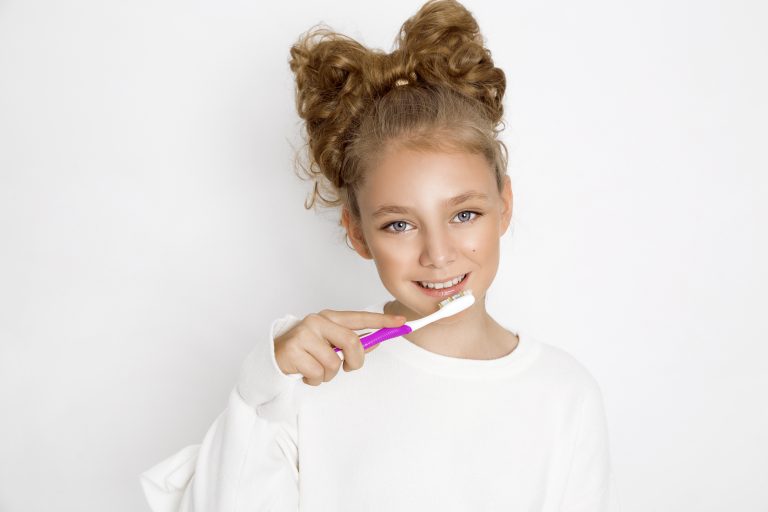
Extra Gentle Care For Their Gums And Teeth
Children should adhere to a regular dental visit schedule, just like adults do. Engaging in routine teeth cleanings and examinations is crucial for safeguarding their oral health and promoting healthy development. These cleanings effectively eliminate plaque, tartar, and bacteria, which are responsible for tooth decay, gum disease, persistent bad breath, and can even impact the proper eruption of adult teeth. With the expertise of a kid-friendly hygienist, inaccessible areas that are challenging for children to clean at home can be thoroughly addressed.
Following a comprehensive cleaning, the hygienist and dentist conduct a meticulous assessment of the child’s overall oral health. This examination encompasses identifying potential issues, monitoring the progress of emerging or shedding baby teeth, and ensuring the proper alignment of permanent teeth. We will provide you with valuable insights to be vigilant about and offer customized tips and tricks for at-home oral care that cater to your child’s specific needs.
Regular pediatric teeth cleanings and exams serve the following purposes:
- Preserve the health and strength of both baby and adult teeth.
- Prevent gum disease and maintain overall oral health.
- Track progress and milestones amidst various dental changes.
- Foster a positive relationship with the dentist.
- Encourage children to independently care for their oral health at home.
- Establish lifelong habits that promote oral hygiene.
What Happens During Children’s Teeth Cleaning?
Before their check-up, we will review their chart and history to quickly find any problem areas or identify troubling patterns. We may take prescribed Xrays or ask about fluoride treatment or sealants for new adult teeth. We will speak to your child in a kid-friendly manner to make them feel comfortable and ask them about how they feel about their teeth and mouth and if they have anything they’d like to ask or share.
Gum health
The importance of healthy gums is often overlooked, as they provide crucial support for your child’s teeth and enhance their smile. Maintaining good gum health becomes particularly vital when permanent teeth start to emerge, as children are equally susceptible to inflammatory gum diseases as adults. During our examinations, we will give special attention to the soft tissues in their mouth and provide age-appropriate guidance on flossing and gum care practices they can follow at home.
Plaque & tartar removal
Plaque, a soft and adhesive film, begins to accumulate on teeth shortly after they erupt. Failure to regularly remove plaque can cause it to harden into tartar deposits. Plaque and tartar are culprits behind tooth decay and can be particularly challenging to eliminate in the spaces between teeth and along the gum-line. A hygienist possesses the necessary tools and expertise to delicately remove stubborn plaque and tartar from these inaccessible areas. Once the plaque and tartar are effectively eliminated, we may suggest a fluoride treatment to strengthen their enamel.
Watching for milestones
During your child’s dental visit, the dentist will carefully review their dental records, including any recent X-rays, and focus on identifying any areas of concern, recurring issues, or new developments that require monitoring. Children typically start getting their primary teeth between 6 months and 6 years of age. Over time, they gradually lose their baby teeth and their permanent adult teeth begin to emerge, a process that continues into their teenage years (and sometimes even later for wisdom teeth!). Each child’s dental journey is unique, and the dentist will closely observe their progress, promptly addressing any concerns or delays that may arise.
Cost Of A Routine Pediatric Teeth Cleaning And Exam In Cornwall
Similar to adult teeth cleanings and exams, regular checkups for children are highly effective in preventing and avoiding dental issues. In fact, most insurance companies offer extensive coverage for routine pediatric dental visits. Depending on your insurance plan, the cost can be as low as $0 to $50, or potentially more. Typically, insurance coverage is provided every 6 months, except in special circumstances. For individuals without dental insurance, the cost can range from $120 to $300 or more, especially for the initial appointment or when it’s been a long time since their last visit.
Several factors come into play when determining the actual cost of treatment:
- The current oral health of your child.
- The need for new X-rays.
- Additional treatments such as fluoride application or sealants for newly erupted adult teeth.
- The amount of time required by the dental team to address their specific needs.
- The necessary equipment and supplies to fulfill their dental care requirements.
Please note that it’s not possible to provide an exact quote over the phone. If you would like personalized information or an itemized quote, we would be more than happy to provide one upon request. Emphasizing the significance of routine pediatric dental care cannot be overstated. Monitoring the changes occurring in their mouths as they grow and develop is the most effective approach to prevent costly and painful complications.
Contact us today
to schedule an initial consultation & exam.
Your consultation will include an examination of everything from your teeth, gums and soft tissues to the shape and condition of your bite. Generally, we want to see how your whole mouth looks and functions. Before we plan your treatment we want to know everything about the health and aesthetic of your smile, and, most importantly, what you want to achieve so we can help you get there.
Frequently Asked Questions
Similar to adults, it is generally recommended for children to schedule dental appointments every 6 months to receive teeth cleaning and checkups, unless advised otherwise by the dentist. In some cases, individuals may opt for visits as frequent as every 3 months. However, it is strongly advised not to exceed a year between appointments to ensure optimal oral health.
Don’t wait. If you have any concerns about your child’s teeth or oral health it’s best to come in right away so we can address any issues while they’re still minor.
Young children lack the ability to gauge what level of discomfort is considered acceptable. Some children may silently endure the pain without expressing it. If you observe any of the following signs, your child may be experiencing discomfort or pain:
- Excessive touching or holding of their face and teeth.
- Defensive or fearful behaviour when approached near their face and teeth.
- Swelling, redness, or discolouration of the gums, cheeks, and teeth.
- Some children may run a fever if they have a toothache.
- Avoidance of hot and cold foods and beverages.
- Avoidance of chewy or hard foods, such as raw vegetables or chunks of meat.
- Preferring to chew on one side of their mouth only.
- Increased irritability and moodiness, which can be indicators of dental pain in children.
It is important to pay attention to these signs and seek dental care if you suspect your child is experiencing dental discomfort or pain.
Most appointments last between thirty minutes to an hour. Dental appointments can take longer if children have lots of questions or for anxious children who need plenty of reassurance and gentle patience.
Ensure to start cleaning your child’s teeth as soon as they emerge, utilizing child-friendly and age-appropriate toothpaste and brushes that are approved for their use. Educate your child about oral hygiene and instil the habit of brushing their teeth independently twice a day. Fluoride treatments greatly benefit children, so consider requesting them at the dentist and incorporating fluorinated products and fluoridated drinking water into their routine. Limit the consumption of sugary or acidic foods and drinks like juice and soda, as they contribute to tooth decay, and especially avoid sweet treats and snacks before bedtime. Set a positive example by maintaining your own oral hygiene by brushing your teeth twice a day and flossing regularly.
Your child should wait at least 30 minutes after a fluoride treatment before eating or drinking. Waiting the full 30 minutes gives the treatment time to work it’s magic before it’s scrubbed away by food and rinsed away with drink.









